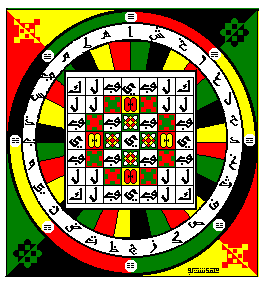Abd’ Al-Qādir Ibn Al-Mustafa
 As for the lineage of Shaykh Abd’l-Qaadir from the direction of his father, he was Abu Muhammad Mu`ayallide, Abd’l-Qaadir (famous as ‘Dan Tafa’) ibn Mustafa ibn Muhammad at-Turudi ibn Ibrahim ibn Musa ibn Ali (known as Aal), ibn Muhammad Jubu ibn Muhammad Sanbu ibn Ayyub ibn Maasiraan ibn Buba Baba ibn Musa Jokolli.
As for the lineage of Shaykh Abd’l-Qaadir from the direction of his father, he was Abu Muhammad Mu`ayallide, Abd’l-Qaadir (famous as ‘Dan Tafa’) ibn Mustafa ibn Muhammad at-Turudi ibn Ibrahim ibn Musa ibn Ali (known as Aal), ibn Muhammad Jubu ibn Muhammad Sanbu ibn Ayyub ibn Maasiraan ibn Buba Baba ibn Musa Jokolli.
He was the grandson of the Shehu from the direction of his oldest daughter; Khadija bint Shehu Uthman ibn Muhammad Fuduye’ ibn Uthman ibn Saalih ibn Haarun ibn Muhammad Ghurtu ibn Muhammad Jubu ibn Muhammad Sanbu ibn Ayyub ibn Maasiraan ibn Buba Baba ibn Musa Jokolli.
The author, (Shaykh Muhammad Shareef) mentions the name of the Shehu in order to demonstrate his connection to him, but also to garner some of his baraka. Shehu Uthman ibn Fuduye` (known in Hausa as Dan Fodio and in Fulbe as Bi Fudi), was the founder of the Sokoto Caliphate. He was considered, as the author mentions, by his contemporaries and those after them, as the Reformer (mujaddid) of the 12th century after the Prophet, may Allah bless him and grant him peace, who promised that at the head of every century a scholar would arise who would revive the religion of Islam and reform its people.
For a detailed understanding of the concept of the mujaddid and his function see M. Hiskett’s The Development of Islam in West Africa, pp. 157 & 161. It is from this phrase that the title of the book is known: Rawdat al-Afkaar (the Sweet Meadows of Contemplation). Some of the scholars of Hausa call it Akhbar ‘l-Bilad ‘s-Sudan. [See Murray Last, Sokoto Caliphate, p. xxx111-xxxiv].
The term bilad ‘s-sudan (the land of the Blacks) refers to the lands of Sub Sahara Africa which lie in the Sahel region from the Atlantic Ocean to the Red Sea and 5 degrees north of the equator. [see Yusef Fadl Hasan’s (ed.), Sudan in Africa, p. 1].
